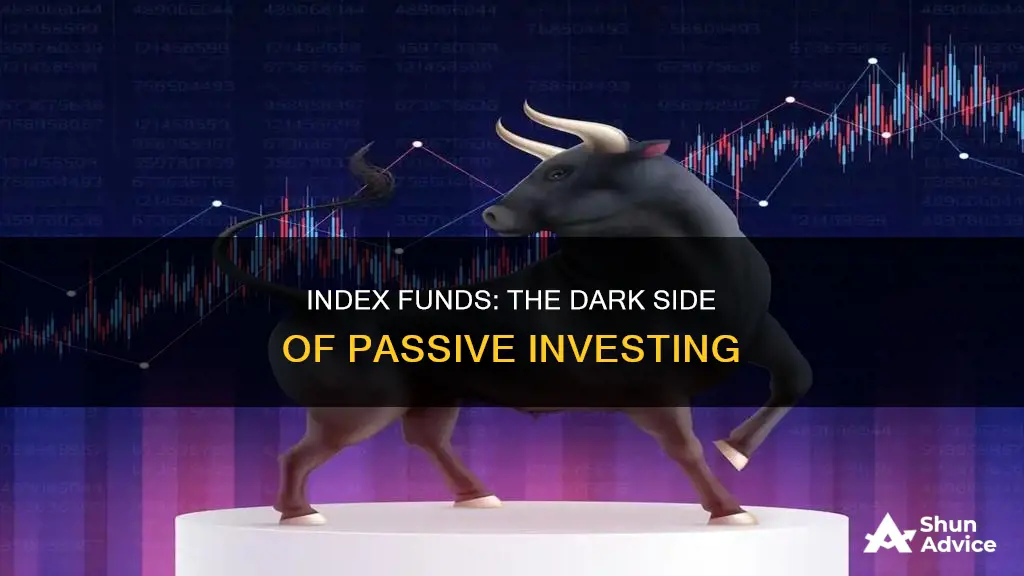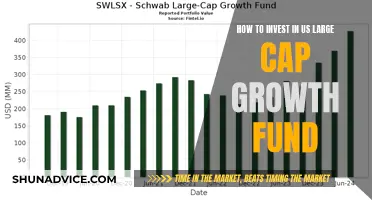
Index funds are a popular investment choice due to their potential for stable long-term returns, diversification, and low fees. However, they have some disadvantages that investors should be aware of before proceeding. One of the main drawbacks is the lack of downside protection, leaving investors vulnerable during market downturns. Additionally, index funds offer limited flexibility, providing no control over individual holdings and limiting exposure to different investment strategies. They are also not suitable for short-term investments as they require a long-term hold period. Despite these disadvantages, index funds remain a favoured investment strategy for many.
What You'll Learn

Lack of downside protection
Index funds are a type of mutual or exchange-traded fund (ETF) that tracks the performance of a market index, such as the S&P 500, by holding the same stocks or bonds or a representative sample of them. They are a passive investment method, meaning they are not actively managed, and are therefore low-cost and convenient.
However, one of the main disadvantages of investing in index funds is the lack of downside protection. This means that there is no floor to losses. When the market declines, so do index funds, and they cannot pivot away when the market shifts. This is in contrast to active fund management, where a good fund manager may be able to limit the downside by hedging the portfolio or moving positions to cash.
Investors with heavy exposure to stock index funds can choose to hedge their exposure to the index by shorting S&P 500 futures contracts or buying a put option against the index. However, these strategies can be costly and may only provide temporary protection.
Overall, the lack of downside protection in index funds can leave investors vulnerable to market downturns and may not be suitable for those seeking more active investment strategies.
Strategies for Locating Lost Mutual Fund Investments
You may want to see also

Lack of reactive ability
Index funds are a type of passive investment that tracks a specific market index, such as the S&P 500. They are designed to replicate the performance of the index by holding the same stocks, bonds, or other securities as the index, or a representative sample of them. This means that investors in index funds do not have the ability to react to market changes by making advantageous trades.
Index funds are passively managed, which means that the fund managers take a hands-off approach and do not actively pick securities or time the market. This lack of reactive ability can be a disadvantage for investors who want to be able to take advantage of market opportunities or protect their investments from downturns.
When a stock becomes overvalued, it carries more weight in the index. Typically, investors would want to reduce their exposure to that stock by lowering their portfolios. However, with index funds, investors cannot act on this knowledge and will be unable to reduce their exposure to overvalued stocks. This can lead to increased risk and potential losses for investors.
Additionally, index funds cannot pivot away from market shifts and will decline in value when the market does. This lack of flexibility can be a disadvantage for investors who want to be able to react quickly to market changes.
Overall, the lack of reactive ability in index funds can be a significant disadvantage for investors who want to have more control over their investments and be able to take advantage of market opportunities. While index funds offer diversification and low fees, investors should carefully consider their investment goals and risk tolerance before investing in index funds.
Pension Planning: Choosing the Right NPS Fund
You may want to see also

No control over holdings
Index funds are a type of passive investment that tracks a market index, such as the S&P 500. They are designed to mirror the performance of the index by holding the same stocks or bonds or a representative sample of them. This means that investors in index funds have no control over the individual holdings in the portfolio. While this can be advantageous in terms of diversification and low costs, it also means that investors cannot choose specific companies they want to own or exclude companies they have negative feelings towards.
One of the main disadvantages of investing in index funds is the lack of control over holdings. Index funds are set portfolios, which means that investors cannot choose which individual stocks or other securities are included in the fund. This can be a disadvantage if there are specific companies that an investor wants to own or avoid. For example, an investor may have a favourite bank or food company that they have researched and want to invest in. Alternatively, an investor may have ethical concerns about a company's environmental practices or the products it makes and may want to avoid investing in that company. With an index fund, the investor cannot make these choices and must accept the companies included in the index, regardless of their personal preferences or beliefs.
Additionally, index funds may not provide the level of diversification that an investor desires. While index funds offer broad market exposure and diversification across various sectors and asset classes, they may not include smaller companies or specific sectors that an investor is interested in. For example, the S&P 500 index fund primarily invests in large-cap companies, and does not provide exposure to small-cap companies, which have historically produced higher returns. If an investor wants to invest in a specific sector or region, they may need to choose a different type of fund or create their own portfolio of individual stocks.
Index funds also have limited flexibility when it comes to reacting to market changes. The portfolios of index funds only change when their benchmark indexes change, which means they cannot quickly respond to overvalued or undervalued stocks. This lack of reactivity can be a disadvantage for investors who want to be able to adjust their portfolios based on market conditions. For example, if a stock becomes overvalued, it will carry more weight in the index, even though astute investors may want to lower their exposure to that stock. With an index fund, investors cannot act on their knowledge of the market and must accept the performance of the index, regardless of any changes they believe should be made.
Overall, the lack of control over holdings in index funds can be a disadvantage for investors who want to have a more active role in choosing the specific companies they invest in or who want to be able to react quickly to market changes. While index funds offer broad diversification and low costs, they may not align with the personal preferences, beliefs, or investment strategies of all investors.
Mutual Funds: Best Time to Invest for Maximum Returns
You may want to see also

Limited exposure to different strategies
Index funds are a type of mutual or exchange-traded fund (ETF) that tracks the performance of a market index, such as the S&P 500, by holding the same stocks or bonds or a representative sample of them. They are a passive investment method, meaning they are passively managed and use a long-term strategy without actively picking securities or timing the market.
One disadvantage of investing in index funds is that they offer limited exposure to different strategies. Index funds are designed to mirror a specific market index, and as a result, they are limited to well-established investment styles and sectors. This lack of flexibility means that index funds cannot pivot away when the market shifts.
For example, the S&P 500 index fund tracks about 80% of all U.S. equities by market cap. This leaves out small-cap companies, which have historically produced higher returns. Additionally, index funds are weighted towards companies with higher market capitalisations, which can lead to a concentration of risk in a few large companies.
Index funds also offer limited exposure to active management strategies, which can be more responsive to market shifts. Active fund managers can limit downside risk by hedging the portfolio or moving positions to cash, whereas index funds simply follow the market downward.
Furthermore, there are countless investing strategies that have been used successfully, and index funds may not give investors access to these strategies. For example, investors may be able to find the best value stocks, growth stocks, or stocks for other strategies through research and combine them into a smaller, more targeted portfolio. This portfolio may be better positioned than the overall market or better suited to an investor's personal goals and risk tolerance.
Mutual Fund Investment: Strategies, Risks, and Rewards
You may want to see also

Dampened personal satisfaction
Index funds are a passive investment method, meaning they are designed to replicate the performance of a market index, such as the S&P 500. While this can be a great low-cost, low-maintenance way to invest, it may not be as personally satisfying as actively choosing and managing your investments.
Index funds are often favoured for their convenience and ability to provide diversification at a low cost. They are also a good option for beginners, as they are relatively simple to understand and don't require a lot of financial knowledge. However, one of the disadvantages of investing in index funds is that they may not provide the same level of personal satisfaction as actively managing your investments.
Actively choosing stocks and managing your own portfolio can be exciting and rewarding. It can give you a sense of control and allow you to feel more connected to your investments. With index funds, you may lose this sense of agency and excitement that comes with making your own investment decisions.
Additionally, investing in index funds may still require some level of monitoring and checking in on the market's performance, which can be stressful during times of market volatility. This is true for most types of investments, but with index funds, you don't have the same level of control and ability to make changes to your portfolio as you would with active investing.
It's important to consider your personal preferences and investment goals when deciding between index funds and active investing. While index funds offer a more passive approach, they may not provide the same level of personal satisfaction and excitement that comes with actively managing your investments.
Smart Strategies for High-Yield Mutual Fund Investments
You may want to see also
Frequently asked questions
There are several disadvantages to investing in index funds. One of the main disadvantages is the lack of downside protection, which means that investors are vulnerable to losses when the market is performing poorly. Index funds also lack the flexibility to pivot when the market shifts and are not suitable for short-term investments. Additionally, investors have no control over the individual holdings in the portfolio and are limited in their exposure to different strategies.
Other disadvantages of investing in index funds include the lack of reactive ability, which means that investors cannot take advantage of overvalued or undervalued stocks. Index funds also have high exposure to large-cap stocks and are inherently less flexible than managed funds.
Index funds are a type of investment fund that tracks the performance of a specific market index, such as the S&P 500. They are passively managed, which means they have a hands-off approach and invest in companies that are included in the market index. Index funds are known for their low fees and broad diversification.
Investing in index funds offers several advantages. Index funds provide a low-cost way to invest in a diversified portfolio of stocks or bonds. They are also easy to invest in and require little financial knowledge. Additionally, index funds have lower fees than actively managed funds and often outperform them in terms of returns.







